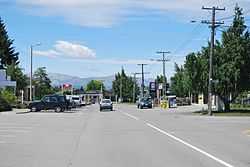Twizel
| Twizel | |
|---|---|
 | |
 Twizel | |
| Coordinates: 44°15′0″S 170°06′0″E / 44.25000°S 170.10000°ECoordinates: 44°15′0″S 170°06′0″E / 44.25000°S 170.10000°E | |
| Country | New Zealand |
| Region | Canterbury |
| Territorial authority | Mackenzie District |
| Elevation | 470 m (1,540 ft) |
| Population (June 2013 estimate)[1] | |
| • Total | 1,110 |
| Time zone | NZST (UTC+12) |
| • Summer (DST) | NZDT (UTC+13) |
Twizel /ˈtwaɪzəl/ is a town in the Mackenzie District, in New Zealand's South Island. Its residential population is 1,110[1] but in summer the population more than triples.
History
The present town was built in 1968 as a greenfields project to service the Upper Waitaki Hydroelectricity Scheme. The scheme consisted of 50 km of canals, two dams, and four powerhouses (Tekapo B, Ohau A, Ohau B and Ohau C) producing 848 MW of electricity. At the height of the project in the 1970s, had a population peaked of around 6,000.
The town was laid out in a 'Scandinavian' fashion, featuring looping roads and pedestrian ways, making it usually far more direct to walk than use a car. Shops, school, and recreational parkland formed a hub in the centre of the town, around which the residential area were built. A previous version of this layout had been tried at Otematata. Accommodation was highly segregated: in addition to single men's quarters in the middle of town, there was a series of different houses available, with the smallest for workers, staff houses for teachers and professionals, and the largest for engineers and other high-status residents.
As the intention was for the town to revert to farmland, there were many 'temporary' features. For example, instead of putting in kerbing, channels, and footpaths at the edge of the road, a single expanse of seal was contoured in a very flat 'W' shape: the seal was highest at the outer edge (footpath) and in the middle (centreline), with a lower area serving as a channel and delineation between the roadway and footpath. Likewise, most of the town's telephone local loop is strung above ground to save the task of burying and then removing the lines. Most houses were prefabricated, and intended to be portable. Some were brought from Otematata, and some were later moved to Clyde for the next hydroelectricity project. However in 1983, as the hydroelectric project was winding up, residents successfully fought to save the town itself.
Industries
Twizel is a now a service and tourist town for visitors. Nearby Lake Ruataniwha supports sailing, water skiing and prominent rowing events such as the Maadi Cup, while the Ohau Skifield and the Round Hill Ski Area attract winter tourists.
The area boasts one of the world's cleanest, driest and darkest skies, and has long drawn astronomers to Twizel and the surrounding area, with several existing astro-tourism ventures, such as at Lake Tekapo and Omarama, catering to their needs during the development of two additional observatories in Twizel and at Mount Cook Village. Since 2012, Twizel has been a part of the Aoraki Mackenzie International Dark-Sky Reserve, one of only five such reserves in the world recognised by the International Dark-Sky Association.[2]
Education
Twizel Area School is the sole school in Twizel, catering for Year 1 to 13 students (ages 5 to 18). Established in 1986 following the merger of Twizel Primary School and Twizel High School, the school has a roll of 199 students as of November 2013.[3]
Transport
State Highway 8 is the main highway serving the town, which is also served by the nearby Pukaki Airport.
Twizel will be on the route of the Alps to Ocean Cycle Trail,[4] to be constructed in the following years after approval in 2010.
Further reading
- Sheridan, Marion (1995). Dam Dwellers – End of an Era. Twizel: Sheridan Press. pp. 392 pages. ISBN 0-473-03402-6.
References
- ↑ 1.0 1.1 "Subnational Population Estimates: At 30 June 2013 (provisional)". Statistics New Zealand. 22 October 2013. Retrieved 4 November 2013. Also "Infoshare; Group: Population Estimates - DPE; Table: Estimated Resident Population for Urban Areas, at 30 June (1996+) (Annual-Jun)". Statistics New Zealand. 19 November 2013. Retrieved 28 November 2013.
- ↑ IDA - http://www.darksky.org/night-sky-conservation/87-international-dark-sky-reserves
- ↑ "Directory of Schools - as at 4 December 2013". New Zealand Ministry of Education. Retrieved 10 December 2013.
- ↑ "Press Release: Destination Mt Cook Mackenzie - National Cycleway Success For Mackenzie Region". Scoop. 12 February 2010. Retrieved 13 July 2010.
External links
| Wikimedia Commons has media related to Twizel. |
- http://www.twizel.info OFFICIAL Twizel website.
| ||||||||